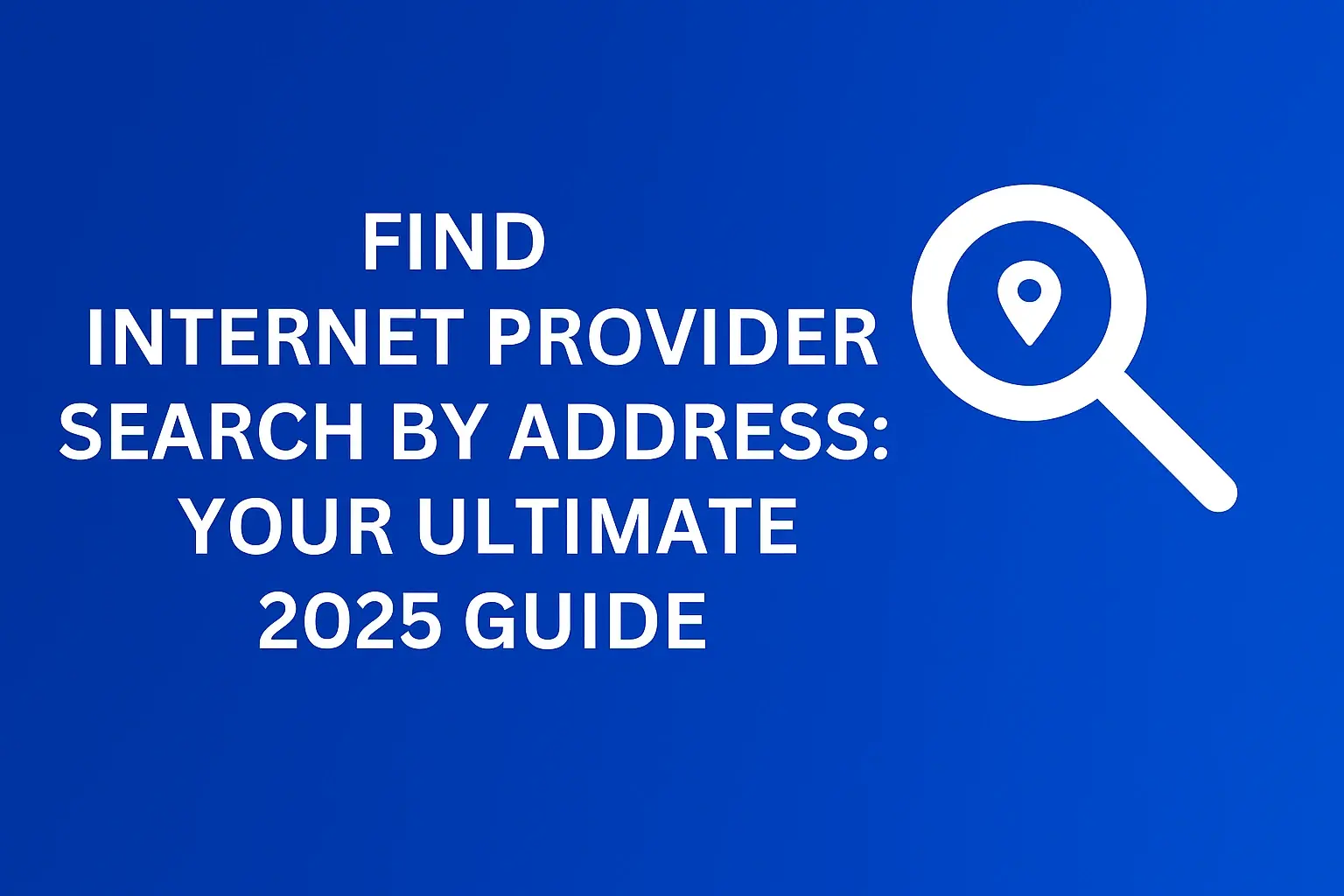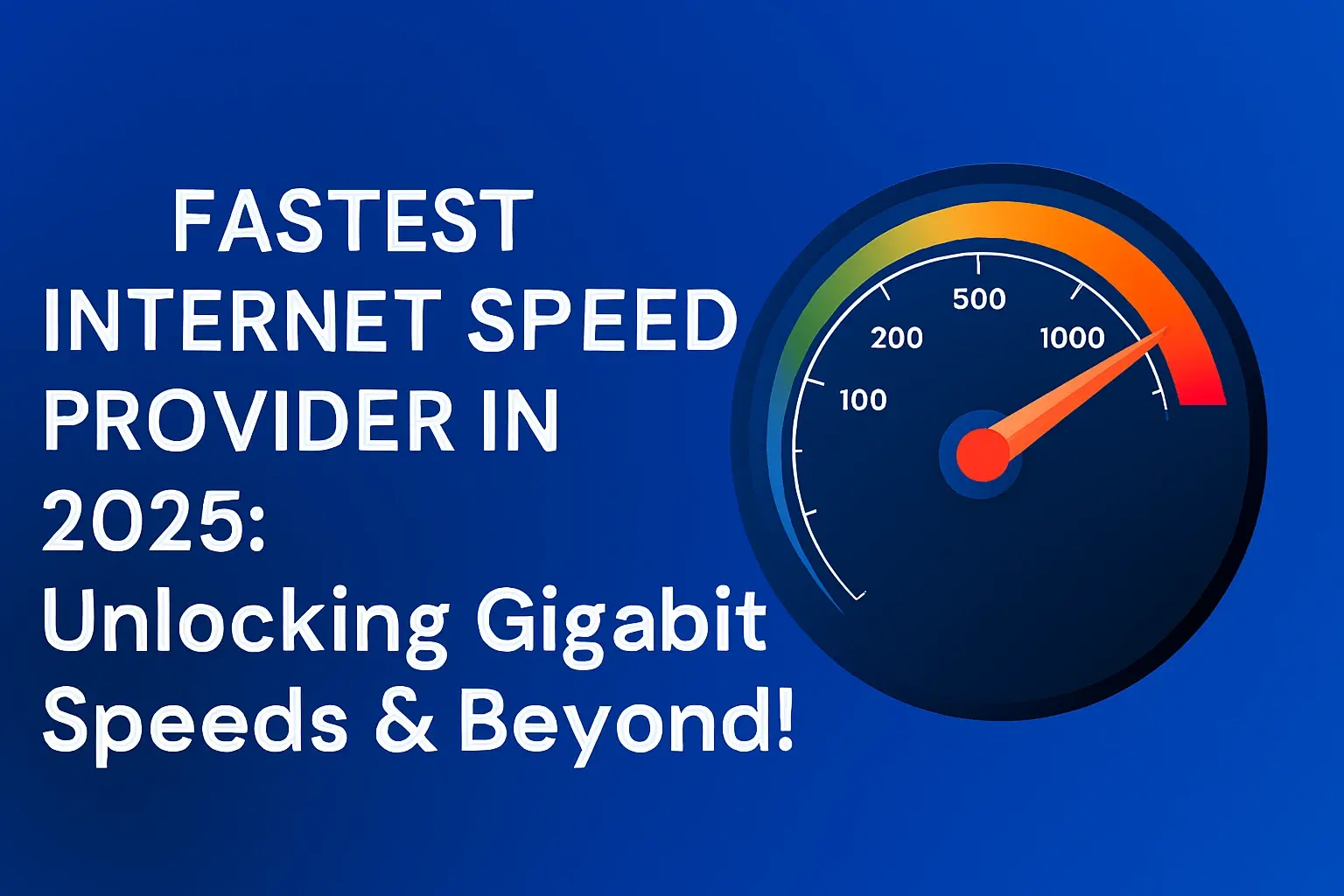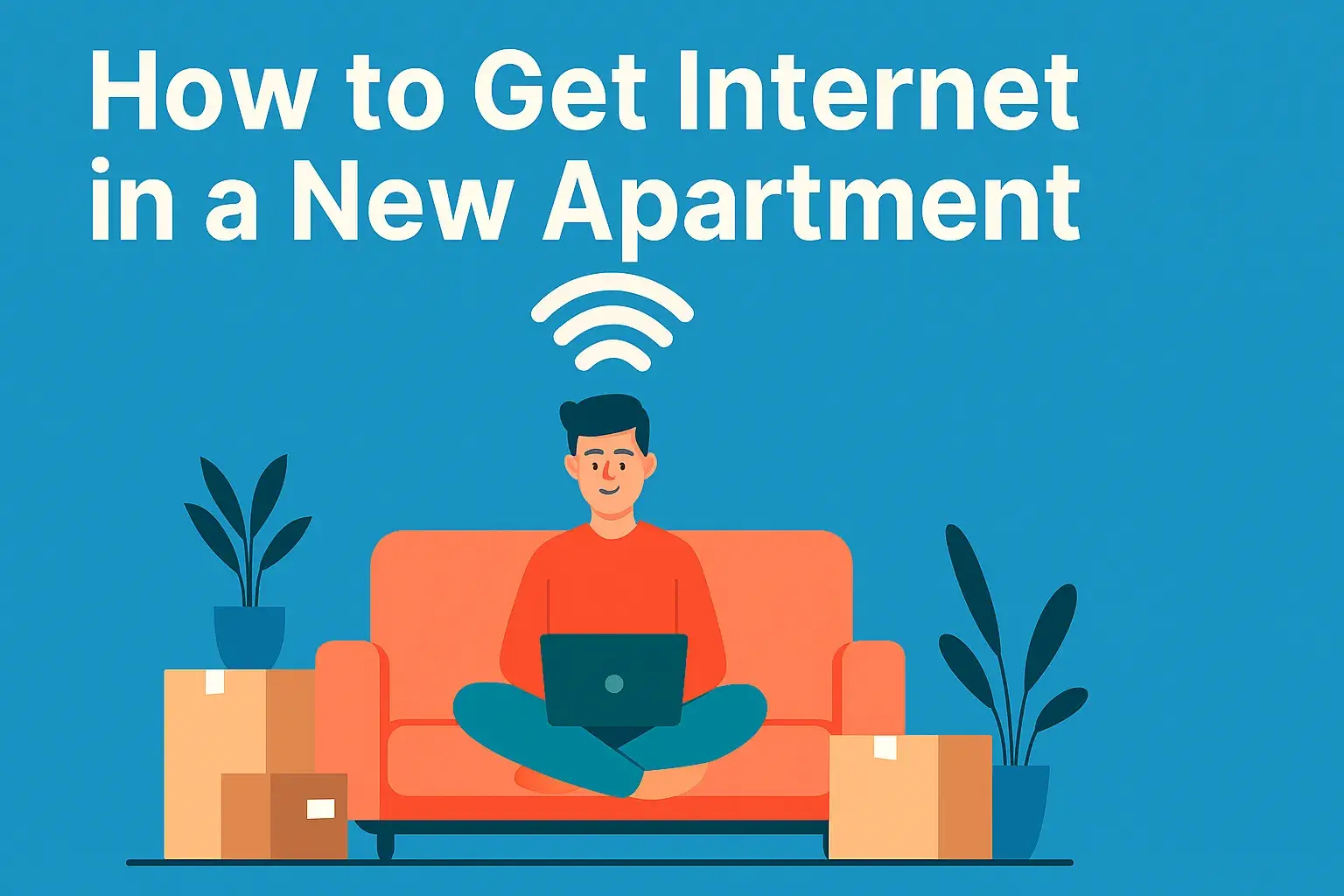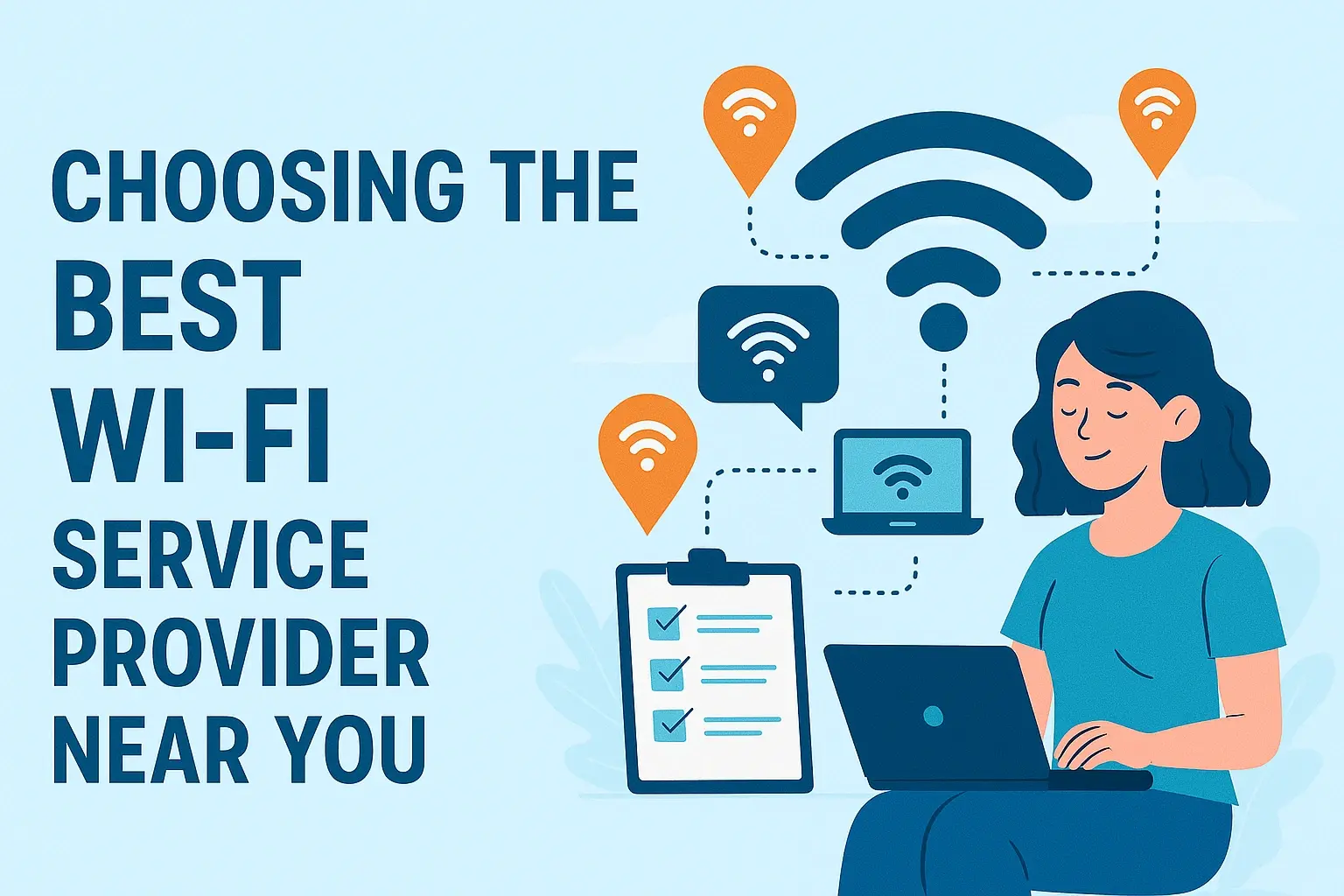Should I Switch Internet Providers: A Comprehensive Guide

Considering a change in your internet service provider can feel daunting. This comprehensive guide will equip you with the knowledge to assess your current plan, understand your options, and make an informed decision about whether switching internet providers is the right move for your needs and budget in 2025.
Understanding Your Current Internet Service
Before you even think about switching, it's crucial to have a clear picture of what you're currently paying for and how well it's meeting your needs. Many consumers sign up for an internet plan and then simply let it auto-renew year after year, often without reviewing the details. This can lead to overpaying for services you don't use or being stuck with an inadequate connection for your current lifestyle.
Reviewing Your Existing Bill
Your monthly bill is a treasure trove of information. Take a close look at:
- Monthly Cost: This is the most obvious figure, but don't forget to look for any hidden fees, equipment rental charges, or promotional discounts that might be expiring soon.
- Advertised Speed: Your bill should state the download and upload speeds you're supposed to receive. This is a key metric for comparison.
- Data Caps: Some plans, particularly satellite or older DSL plans, come with monthly data allowances. Exceeding these can result in throttling or extra charges.
- Contract Length: Are you still under contract? Breaking a contract early often incurs significant early termination fees (ETFs).
- Equipment Fees: Many providers charge a monthly fee to rent a modem and/or router. Owning your own equipment can sometimes save money in the long run.
Testing Your Current Internet Speed
The speeds advertised by your provider are often "up to" speeds, meaning you might not consistently receive them. To get an accurate picture, perform speed tests at different times of the day and on different devices. Use reputable online speed test tools like Speedtest.net or Fast.com. Pay attention to both download and upload speeds, as well as ping (latency).
- Download Speed: This is how quickly you can receive data from the internet. Essential for streaming, downloading files, and general browsing.
- Upload Speed: This is how quickly you can send data to the internet. Important for video calls, uploading large files, and online gaming.
- Ping/Latency: This measures the delay between sending a request and receiving a response. Lower ping is better, especially for real-time applications like gaming and video conferencing.
For 2025, typical residential internet speeds vary widely by technology. Fiber optic connections can offer symmetrical speeds of 1 Gbps or even 10 Gbps, while cable can offer download speeds from 100 Mbps to over 1 Gbps, with upload speeds typically being a fraction of that. DSL speeds are generally lower, ranging from 10 Mbps to 100 Mbps, and satellite internet often has the lowest speeds and highest latency.
Assessing Your Current Provider's Performance
Beyond just speed, consider the overall reliability and customer service of your current provider. Have you experienced frequent outages? Is their customer support responsive and helpful when issues arise? Online reviews and forums can offer insights into other users' experiences with your provider in your specific area.
Signs It Might Be Time to Switch Internet Providers
Several red flags indicate that your current internet service might not be the best fit anymore. Recognizing these signs is the first step towards finding a better solution.
Consistently Slow Speeds
If your speed tests consistently show speeds significantly lower than what you're paying for, and troubleshooting by your provider hasn't resolved the issue, it's a strong indicator that you might be getting a raw deal. This is especially true if your needs have increased, and your current speeds are no longer adequate for your daily activities.
Frequent Outages and Unreliability
An internet connection that frequently drops or is unreliable can be incredibly frustrating. If you're constantly dealing with connectivity issues, it might be time to explore providers known for better network stability in your region. Reliability is paramount, especially if you work from home or rely on a stable connection for essential services.
Rising Costs and Expiring Promotions
Many providers lure new customers with attractive introductory offers that expire after a year or two. If your bill has significantly increased after a promotional period ended, and you haven't seen a corresponding increase in service quality, you're likely overpaying. By 2025, the average monthly cost for broadband internet in the US can range from $60 to $100+, depending on speed and technology, but significant variations exist.
Poor Customer Service
When problems arise, you need a provider that offers accessible, knowledgeable, and helpful customer support. If you've had consistently negative experiences with your current provider's customer service, it’s a valid reason to consider switching. Long hold times, unhelpful representatives, and unresolved issues can make even a decent internet plan feel unbearable.
Lack of Desired Features or Technology
Perhaps your internet needs have evolved. You might need higher upload speeds for video conferencing, or you might be interested in the superior performance of fiber optic internet, which isn't available from your current provider. If your current service doesn't offer the technology or features you require, it's time to look elsewhere.
Contract Expiration or Upcoming Price Hikes
If your contract is nearing its end, it's the perfect opportunity to re-evaluate your options. Many providers offer new customer deals that are significantly better than existing customer retention offers. Similarly, if you're aware of an upcoming price increase, use that as a catalyst to shop around.
Evaluating Your Internet Needs
To make an informed decision, you need to accurately assess how you use the internet and what speeds and features are truly necessary for your household. This prevents you from overspending on unnecessary bandwidth or underspending and ending up with a slow, frustrating connection.
Household Size and Number of Devices
The more people and devices connected to your network, the more bandwidth you'll need. A single person streaming Netflix might be fine with 50 Mbps, but a family of four, each with multiple devices (smartphones, laptops, smart TVs, gaming consoles, smart home devices), could easily require 200 Mbps or more.
- Single User: 25-50 Mbps download
- Couple/Small Family (2-4 devices): 100-200 Mbps download
- Larger Family (5+ devices): 200-500+ Mbps download
In 2025, the average household has more connected devices than ever before, with many homes boasting over 10 smart devices. This trend necessitates higher bandwidth to avoid congestion.
Primary Internet Activities
What do you primarily use the internet for? Different activities have different bandwidth requirements:
- Basic Browsing & Email: Low bandwidth requirements (e.g., 10-25 Mbps).
- Streaming Standard Definition (SD) Video: Requires around 3-5 Mbps per stream.
- Streaming High Definition (HD) Video: Requires around 5-8 Mbps per stream.
- Streaming 4K Ultra HD Video: Requires around 15-25 Mbps per stream.
- Online Gaming: Requires stable, low-latency connections. While download speed is important for game downloads, upload speed and ping are critical for gameplay. 50-100 Mbps download is generally sufficient, but low latency is key.
- Video Conferencing (e.g., Zoom, Google Meet): HD video conferencing can consume 2-4 Mbps download and 1-3 Mbps upload. For multiple participants or higher quality, these needs increase.
- Large File Downloads/Uploads (e.g., for work, creative projects): High download and especially upload speeds are crucial.
Work-From-Home Requirements
If you work remotely, your internet connection is your lifeline. You'll likely need a robust connection that can handle video calls, VPNs, large file transfers, and constant connectivity without interruption. Consider a plan with at least 100 Mbps download and 10-20 Mbps upload, with a strong emphasis on reliability. For those in creative fields or who handle very large files, gigabit speeds might be a worthwhile investment.
Future-Proofing Your Connection
Consider your future needs. Are you planning to add more smart devices, subscribe to more streaming services, or have more people move into your household? It might be wise to opt for a slightly higher speed than you currently need to avoid having to upgrade again in the near future. In 2025, 1 Gbps plans are becoming increasingly accessible and affordable for many households, offering ample headroom for future demands.
Exploring Different Internet Technologies
The type of internet technology available in your area significantly impacts speed, reliability, and cost. Understanding these differences is key to choosing the best provider.
Fiber Optic Internet
Pros: The fastest and most reliable technology available. Offers symmetrical download and upload speeds, meaning your upload speed is as fast as your download speed. Extremely low latency, making it ideal for gaming and real-time applications. Less susceptible to interference and weather conditions.
Cons: Availability is limited, primarily found in more densely populated urban and suburban areas. Installation can sometimes be more involved.
2025 Outlook: Fiber expansion continues to be a major focus for ISPs. Many providers are investing heavily in rolling out fiber networks, making it more accessible each year. Speeds commonly range from 300 Mbps to 10 Gbps.
Cable Internet
Pros: Widely available in most urban and suburban areas. Offers high download speeds, often comparable to fiber in advertised rates, though upload speeds are typically much lower. Relatively affordable.
Cons: Bandwidth is shared with your neighbors, so speeds can slow down during peak usage hours. Upload speeds are significantly slower than download speeds (often 10-50 Mbps). More susceptible to network congestion.
2025 Outlook: Cable providers are upgrading their networks (e.g., DOCSIS 3.1 and 4.0) to offer higher speeds and improve performance. Many cable plans now offer download speeds of 500 Mbps to 1 Gbps, with upload speeds typically in the 20-50 Mbps range.
DSL (Digital Subscriber Line) Internet
Pros: Uses existing telephone lines, making it widely available, especially in rural areas where cable or fiber might not reach. Generally more affordable than cable or fiber.
Cons: Speeds are significantly slower than cable or fiber, especially as distance from the provider's central office increases. Upload speeds are very slow. Performance can be affected by phone line quality.
2025 Outlook: DSL is considered an older technology and is being phased out in many areas in favor of faster options. However, it remains a viable option for basic internet needs in underserved regions. Speeds typically range from 10 Mbps to 100 Mbps download.
Satellite Internet
Pros: Available almost anywhere with a clear view of the sky, making it a crucial option for very rural or remote locations. Installation is usually straightforward.
Cons: Highest latency among all technologies, making it unsuitable for real-time applications like gaming or video conferencing. Speeds can be inconsistent and affected by weather (rain, snow). Often comes with strict data caps. Can be the most expensive per Mbps.
2025 Outlook: Newer satellite constellations (like Starlink) are improving speeds and reducing latency compared to traditional geostationary satellites, but they still lag behind terrestrial options. Traditional satellite providers continue to operate, often with limited performance. Speeds can vary greatly, from 25 Mbps to over 100 Mbps with newer services, but latency remains a significant issue.
Fixed Wireless Internet
Pros: Offers an alternative to DSL or satellite in rural and suburban areas where wired infrastructure is lacking. Can provide decent speeds, often better than DSL. Less expensive than satellite in some cases.
Cons: Performance can be affected by line-of-sight to the tower and weather conditions. Speeds and reliability can vary significantly between providers and locations. Data caps are common.
2025 Outlook: Fixed wireless is a growing segment, particularly in areas underserved by fiber or cable. Advancements in technology are improving its capabilities. Speeds can range from 25 Mbps to 100+ Mbps download.
For a comprehensive comparison, consider this table:
| Technology | Typical Download Speed (2025) | Typical Upload Speed (2025) | Latency (Ping) | Availability | Best For |
|---|---|---|---|---|---|
| Fiber Optic | 300 Mbps - 10 Gbps | 300 Mbps - 10 Gbps | Very Low (5-20 ms) | Urban/Suburban | Heavy users, gamers, remote workers, 4K streaming |
| Cable | 100 Mbps - 1 Gbps | 10 Mbps - 50 Mbps | Low (20-50 ms) | Urban/Suburban | General use, streaming, moderate gaming |
| DSL | 10 Mbps - 100 Mbps | 1 Mbps - 10 Mbps | Moderate (50-100 ms) | Widespread, especially rural | Basic browsing, email, light streaming |
| Satellite | 25 Mbps - 100+ Mbps (new tech) | 3 Mbps - 20 Mbps | Very High (500+ ms) | Nearly everywhere | Remote locations with no other options |
| Fixed Wireless | 25 Mbps - 100+ Mbps | 5 Mbps - 20 Mbps | Moderate to High (30-150 ms) | Rural/Suburban | Alternative to DSL/Satellite |
Comparing Internet Providers and Plans
Once you understand your needs and the available technologies, it's time to dive into the specifics of comparing providers and their offerings. This is where meticulous research pays off.
Identify Available Providers in Your Area
Not all providers offer service everywhere. Start by using online tools that allow you to enter your address and see which ISPs operate in your specific location. Major national providers (like Verizon, AT&T, Spectrum, Xfinity) may be available, but also look for regional or local providers, as they sometimes offer competitive pricing or unique services.
Compare Pricing and Fees
This is more than just looking at the advertised monthly price. Be sure to compare:
- Base Monthly Price: The advertised cost for the service.
- Promotional Pricing: How long does the introductory rate last? What is the price after the promotion ends?
- Equipment Rental Fees: The cost to rent a modem and/or router.
- Installation Fees: Some providers charge a one-time fee for setup.
- Other Fees: Look for potential "service fees," "regulatory fees," or "broadcast fees."
- Data Caps: Are there limits on your monthly data usage? What are the overage charges or throttling policies?
In 2025, the average monthly cost for a 300-500 Mbps cable or fiber plan can range from $60 to $90, but this varies wildly by region and provider. Always aim for transparency in pricing.
Analyze Speed and Data Allowances
Match the advertised speeds (download and upload) to your assessed needs. Don't pay for gigabit speeds if you only browse the web and check email. Conversely, don't settle for 50 Mbps if you're streaming 4K content on multiple devices. Pay close attention to data caps, especially if you're considering DSL or satellite, as they can significantly limit your usage.
Read the Fine Print on Contracts
Understand the contract terms. Are you locked into a one-year, two-year, or month-to-month agreement? What are the penalties for early termination (ETFs)? Many providers offer better deals for longer commitments, but this reduces your flexibility.
Research Customer Reviews and Reliability
Online reviews, forums, and consumer reports can provide valuable insights into a provider's actual performance and customer service quality in your area. Look for patterns in complaints regarding outages, slow speeds, or billing issues. A slightly more expensive plan from a highly reliable provider might be worth the investment.
Consider Bundling Options
Many providers offer bundles that include internet, TV, and phone services. While these can sometimes offer savings, carefully evaluate if you actually need all the bundled services. Often, unbundling and purchasing services separately can be cheaper. If you do bundle, ensure the internet component meets your needs.
Look for New Customer Promotions
Providers are highly competitive, especially for new customers. Research current sign-up bonuses, free equipment offers, gift cards, or discounted installation. These can significantly reduce the initial cost of switching.
Here's a quick checklist for comparison:
- Provider Name: [Provider A, Provider B, etc.]
- Technology: [Fiber, Cable, DSL, etc.]
- Advertised Download Speed: [Speed]
- Advertised Upload Speed: [Speed]
- Monthly Price (after promo): [Price]
- Contract Length: [Months/Year]
- Data Cap: [Yes/No, Amount]
- Equipment Rental Fee: [Price/Month]
- Installation Fee: [Price]
- Customer Service Rating (based on reviews): [Good/Fair/Poor]
- Reliability Rating (based on reviews): [Good/Fair/Poor]
The Switching Process: Step-by-Step
Switching internet providers doesn't have to be a hassle. By following these steps, you can ensure a smooth transition with minimal disruption to your service.
Step 1: Research and Select Your New Provider
This is the most critical step, involving all the comparison work discussed previously. Identify the best provider and plan that meets your needs and budget. Ensure they offer service at your address.
Step 2: Check for Early Termination Fees (ETFs) with Your Current Provider
Before committing to a new provider, contact your current ISP to understand your contract status and any potential ETFs. If you're still under contract, weigh the cost of the ETF against the savings you'll achieve with the new provider. Sometimes, the savings over a year or two can more than offset the ETF.
Step 3: Schedule Installation with Your New Provider
Once you've chosen a provider and confirmed your contract status, schedule your installation appointment. Be aware that installation appointments can sometimes be weeks out, especially during peak seasons. Try to schedule it for a time when you can be home to oversee the setup.
Step 4: Prepare for Installation Day
On installation day, ensure someone is home to grant access to the technician. Clear the area where the modem and router will be installed. Have your Wi-Fi network name (SSID) and password ready if you plan to set up your own network.
Step 5: Installation and Setup
The technician will run any necessary cables, install the modem, and test the connection. They will typically set up a basic Wi-Fi network for you. If you plan to use your own router, you can usually connect it after the technician leaves or ask them to configure the modem in bridge mode.
Step 6: Test Your New Connection
Immediately after the technician leaves, perform speed tests on multiple devices to ensure you're receiving the speeds you're paying for. Test upload and download speeds, and check latency. Also, test Wi-Fi signal strength throughout your home.
Step 7: Return Equipment to Your Old Provider
Contact your old provider to arrange for the return of any leased equipment (modem, router). Most providers have a specific process for this, often involving shipping the equipment back or dropping it off at a designated location. Failure to return equipment can result in significant charges.
Step 8: Cancel Your Old Service
Once you've confirmed your new service is working correctly and you've returned your old equipment, contact your old provider to officially cancel your service. Get confirmation of cancellation in writing or via email to avoid any billing disputes.
Step 9: Update Your Wi-Fi Network Information
If you're using your own router or the new provider's router, you'll need to update the Wi-Fi network name (SSID) and password on all your devices (smartphones, laptops, smart TVs, gaming consoles, etc.).
Consider this timeline for a smooth switch:
- Week 1-2: Research, compare providers, check ETFs.
- Week 2-3: Select new provider, schedule installation.
- Installation Day: Technician visit, setup, initial testing.
- Post-Installation: Thorough testing, return old equipment, cancel old service, update Wi-Fi.
Potential Drawbacks and How to Mitigate Them
While switching providers can bring significant benefits, it's wise to be aware of potential challenges and how to navigate them.
Service Interruption
Drawback: There's a risk of a brief period without internet service between the disconnection of your old provider and the activation of your new one. This is particularly concerning for those who work from home or rely heavily on constant connectivity.
Mitigation:
- Schedule the installation of your new service for the same day or the day after you plan to cancel your old service.
- Have a backup internet option, such as a mobile hotspot from your smartphone, available for emergencies.
- If possible, schedule the switch for a weekend or a day when you have less critical online work.
Early Termination Fees (ETFs)
Drawback: If you're still under contract with your current provider, breaking it early can incur substantial fees, sometimes hundreds of dollars.
Mitigation:
- Carefully review your current contract for the ETF amount.
- Calculate the potential savings from the new provider over the remaining contract period. If the savings outweigh the ETF, it might still be financially beneficial to switch.
- Some new providers offer to cover ETFs up to a certain amount as a promotional incentive.
- Wait until your contract is close to expiring to avoid ETFs altogether.
Installation Issues
Drawback: Installation can sometimes be delayed, complicated, or result in suboptimal placement of equipment.
Mitigation:
- Book your installation appointment well in advance.
- Be present during the installation to guide the technician and ensure optimal placement of the modem/router for Wi-Fi coverage.
- If you have specific wiring or setup needs, communicate them clearly to the technician.
- Thoroughly test the connection and Wi-Fi coverage immediately after installation.
Equipment Compatibility and Performance
Drawback: The modem or router provided by the new ISP might not perform as well as your old equipment, or it might not be compatible with your existing home network setup.
Mitigation:
- Consider purchasing your own compatible modem and router. This often offers better performance and avoids monthly rental fees. Research compatibility lists from the ISP.
- If using the provider's equipment, ensure it meets your speed requirements.
- If you experience poor Wi-Fi performance, consider using a mesh Wi-Fi system or a Wi-Fi extender.
Hidden Fees and Price Increases
Drawback: The advertised price might not reflect the total cost, and prices can increase after introductory periods.
Mitigation:
- Read all contract terms and fee schedules carefully before signing up.
- Keep a record of the initial advertised price and any promotional details.
- Set a calendar reminder for when promotional periods end to proactively negotiate or shop around again.
- Always inquire about potential price increases in the future.
Customer Service Surprises
Drawback: You might switch to a provider with poor customer service, leading to frustration when issues arise.
Mitigation:
- Thoroughly research customer service reviews from multiple sources before choosing a provider.
- Understand the different channels for customer support (phone, chat, online).
- Keep records of all interactions with customer service, including dates, times, representative names, and issue resolutions.
Making the Final Decision
After navigating the research, comparison, and understanding of potential pitfalls, you're ready to make a confident decision about whether to switch internet providers.
Weighing the Pros and Cons
Review your findings. Create a simple pros and cons list for staying with your current provider versus switching to your top choice. Consider factors like:
- Cost Savings: How much will you save monthly and annually?
- Speed and Performance Improvements: Will the new service significantly enhance your online experience?
- Reliability: Is the new provider known for better uptime in your area?
- Customer Service: Is there evidence of better support?
- Contractual Obligations: Are ETFs a significant barrier?
- Technological Advancement: Are you moving to a superior technology like fiber?
Trust Your Gut (and Your Data)
While data and research are crucial, sometimes your intuition plays a role. If one provider consistently appears to offer better value, reliability, and service based on your research, it's likely the right choice. Conversely, if your current provider, despite minor annoyances, meets your core needs at a reasonable price and you dread the hassle of switching, staying might be the better option.
Don't Be Afraid to Negotiate
Before finalizing a switch, or even if you decide to stay, consider calling your current provider. Let them know you're considering switching due to price or service issues. Often, they have retention specialists who can offer discounts, upgrades, or other incentives to keep your business. This is particularly effective if you're out of contract.
Consider a Trial Period if Available
Some providers offer a trial period (e.g., 30 days) during which you can cancel service without penalty if you're not satisfied. This can be a great way to test a new provider with minimal risk.
Final Recommendation Checklist
Before you click "sign up" or make that final call, ask yourself:
- Have I accurately assessed my internet needs?
- Do I understand the available technologies in my area?
- Have I compared pricing, fees, and contract terms thoroughly?
- Have I researched customer reviews and reliability?
- Am I aware of and prepared for potential drawbacks like ETFs or service interruptions?
- Does the potential benefit of switching outweigh the effort and any associated risks?
If you can answer "yes" to these questions, you're well-prepared to make the best decision for your internet service in 2025.
Conclusion
Deciding whether to switch internet providers is a significant choice that impacts your daily connectivity and budget. By thoroughly understanding your current service, meticulously evaluating your household's internet needs, and exploring the available technologies and providers, you can arm yourself with the information necessary to make an informed decision. In 2025, the landscape of internet service continues to evolve, with fiber optic expansion and advancements in other technologies offering better speeds and reliability than ever before. Don't let expiring promotions or rising costs go unnoticed; proactively research your options. Remember to always read the fine print, compare total costs including fees, and consider customer service and reliability ratings. By following the structured approach outlined in this guide, you can confidently navigate the switching process, mitigate potential drawbacks, and secure an internet connection that truly serves your needs.





